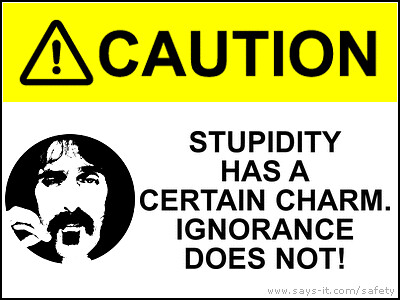I also caught
Godzilla in theaters, and thought it was pretty “meh”. The initial trailer was better than the film, itself, so that’s never good. I mean, that trailer was fucking killer, it’s true. But still, your film should at least be as good as the trailer in parts. Otherwise, people are gonna talk.
Which brings us to
Edge of Tomorrow, the
Tom Cruise shoulda-been-a-blockbuster cinema-biz mystery of the year. “Why didn't it do better at the box?” everyone wanted to know. Is Cruise’s star power finally starting to fade? Frankly, although I enjoyed Edge of Tomorrow – or, as it’s been re-branded in a rather desperate attempt to entrap new viewers,
Live, Die, Repeat – I couldn't quite agree with those calling it a masterpiece, or even particularly good science-fiction. It’s a bubble-gum action movie with an interesting twist, visually uninteresting aliens with a ridiculously awkward weakness (kill the mama, they all fall down), and a few good jokes. That’s all.
Those of you who know me well know that, when it comes to comics, I’m a
Marvel boy. So of course I caught
Captain American Winter Soldier, a.k.a.
Seven Days of the Condor in May (get it?). It was wildly exciting, beautifully rendered, thrilling from beginning to end, and certainly did a good job of imparting gravitas to the character of Captain America. Also, it had my favorite line in pop cinema this year (“Hail Hydra!”). Two thumbs way up.
Of course we can’t discuss Marvel and 2014 blockbusters without bringing up the year’s top earner at the global box, Marvel’s
Guardians of the Galaxy. It certainly brought the cute… a little too much cute for my taste, truth be told. But it was fun and frothy and feather-light, and nothing more need be said about it, except to say that I can’t wait for
Dr. Strange to finally bring a little darkness and danger to Marvel’s cinematic universe. Isn't it time one of these movies had a hero that we’re actually more than a little bit afraid of? Hulk doesn't count, of course, because I love Hulk as a mother loves a favorite child.
Speaking of dark Marvel characters, 2014 brought us rampaging pederast
Bryan Singer’s dank and dour
X-Men Days of Future Past. Budgeted at an astonishing $200 million with a featured cast of dozens, this movie gets so many things wrong that I don't even know where to begin. The far-future Sentinels allegedly based on Mystique’s chameleon powers suddenly being able to replicate the powers of any mutants they come into contact with (whereas Mystique can only copy appearances, not powers) is one of myriad dumbass blunders that made this movie almost unwatchable for me. The lack of even a single decent Wolverine scrap only compounded things. The Quicksilver scene was fantastic, though… a diamond in the crap-heap.
2014 has been kind of a shit year for comedies, with only three of note sticking in my brain-pan.
Alan Partridge: Alpha Papa was good fun, if a bit by-the-numbers in the plot department. I’m a huge
Steve Coogan fan, however, so I’m not exactly impartial. The bizarre and utterly perverse Danish comedy
Klovn, in which
Frank Hvam kidnaps his nephew and takes him on a canoe trip with his orgy-loving buddy, Casper, originally came out in 2010, but I only saw it this year, so fuck you.
Dumb and Dumber is in my top ten films of all time – not comedies, mind you, but
films – so I was worried about
Dumb and Dumber To. Although it had a few hearty laughs, it was otherwise disappointing.
I saw a bunch of decent horror films this year, including the shockingly good independent feature
Proxy, about which I refuse to say anything other than to insist that you find a copy and watch it as soon as humanly possible. The Australian effort
The Babadook and New Zealand’s
Housebound are also worth watching. Both gave nice twists on old tropes, even though both were also a bit more familiar than their biggest cheerleaders in the press let on. The Babadook suffered from a weak finale, and Housebound stole its biggest and best scare from the American 70’s TV movie,
Bad Ronald. If your tastes run towards Satanic secret societies and body horror, then
Starry Eyes needs to go on your “must see” list ASAP. And if you’re into Bigfoot movies, you’re in luck, because this year saw two decent ones:
Exists and
Willow Creek.
Kevin Smith’s
Tusk was an inexcusable piece of shit.
Turning our attention towards the highbrow, I caught
Blue Ruin on the recommendation of my partner in crime,
Marc Roussel, and although I didn't like it as much as he did, I still thought it was a worthwhile effort. It would make a great double-feature with
Red, White and Blue, one of the most harrowing independent dramas I caught all year. I saw
Gone Girl and didn't see what all the fuss was about.
My favorite films of 2014 are a varied bunch.
Wes Anderson’s
The Grand Budapest Hotel hit all the right buttons for me. If you're not a fan of his films, then don't bother, because this one is just like the other ones, only more so. For me, that’s an unqualified recommendation. With
A Field in England,
Ben Wheatley continues his ascent to the cinematic pantheon. After watching
Kill List,
Sightseers, and now this one, I'm almost afraid to see what he’s going to dish up in his adaptation of
J.G. Ballard’s dystopic novel,
High Rise, next year.
Jodorowsky’s Dune was my favorite documentary of the year, which is understandable seeing as it’s about one of my favorite people in the universe. I thoroughly enjoyed
Jim Jarmusch’s dreamy vampire dramedy
Only Lovers Left Alive, which featured beautiful performances by the leads – feral and controlled, perfectly vampiric.
Johnathan Glazer’s
Under the Skin left me confused on first watch, but subsequent viewings allowed for a deeper appreciation. Aesthetically, it’s near perfect.
This year also saw a veritable torrent of crap, of which I fortunately only saw a few:
Amazing Spider Man 2, which was just shockingly, inexplicably bad. Just horrendous. And then there was
The Interview. Sweet Christ… I had to wonder at what point
Seth Rogen realized that, yes indeed,
James Franco was going to be going with THAT kind of performance, and whether that realization caused him to vomit right then and there, or was he able to keep it under control just long enough to reach the washroom where he could quietly sob the hurt away in a private stall?
2014 also saw a bunch of remakes and sequels that nobody wanted, chief among them being
Robocop,
Teenage Mutant Ninja Turtles,
Sin City: A Dame to Kill For,
Exodus Gods and Kings and the overly-titled
Night at the Museum Secret of the Tomb. I’d say the same for
Transformers Age of Extinction, but that movie made almost as much as Guardians of the Galaxy, so weep for the world, but don't call it a failure. This year also saw three of the worst hunks of right-wing propaganda ever committed to digital video:
Atlas shrugged III, the
Left Behind remake (with
Nicholas Cage taking over the role made famous by
Kirk Fucking Cameron) and the ridiculous
God’s Not Dead, in which Hercules proves that intellectuals don’t know SHIT.
There are a bunch of movies that came out this year that I have yet to see, but that I plan to see in the coming weeks. Among these are
Nightcrawler,
Boyhood,
What We Do in the Shadows,
Dawn of the Planet of the Apes,
Leviathan,
Foxcatcher,
Birdman,
Alleluia,
Citizenfour,
The Imitation Game,
The Dance of Reality, Inherent Vice and
Snowpiercer.
And, finally, although I don't watch very much television, the boob tube has managed to produce a number of interesting cultural concoctions over the last 12 months. Series that I have enjoyed this year include
Tim and Eric’s Bedtime Stories and
The Eric Andre Show, both for Adult Swim. The Cartoon Network’s
Over the Garden Wall might be the finest piece of pure storytelling that I encountered in any medium in 2014, and, as I've stated in this space before, it deserves ALL THE AWARDS. The UK’s
Utopia: Series Two isn't quite as good as the first series, but it's still head and shoulders above any American series, with the possible exception of
True Detective (blown last episode notwithstanding) and
The Knick. As far as comedy goes,
Enlightened was heavy and
Silicon Valley was light, but both were very well done and I will definitely be revisiting them next season. And even though
Charlie Brooker’s incredible anthology series
Black Mirror wasn't back for a full season this year, we did get the amazing 90-minute special
Black Mirror / White Christmas, which was the best serious science fiction offering in any medium this year.
And so there you have it. My entertainment year in review for 2014. Please note that I didn't mention
Interstellar or
I, Frankenstein anywhere in this rather lengthy article, which is something I think that will set me apart from the rather crowded year-in-review field this year. Thank you. Thank you very much. Thank you. Thanks.
Okay, I’m off to watch
Nightcrawler now. Cheers!
Yer old pal Jerky









